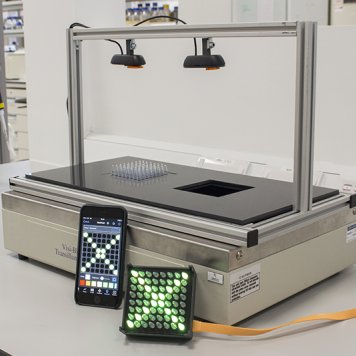
Submitted by Administrator on Thu, 23/03/2017 - 18:26
The BioDesign challenge asks students, in consultation with scientists and design professors, to create designs that demonstrate how biotech might reshape our world—from foods, to materials, to energy, to medicine. The pilot program in 2016, which culminated in a summit at the Museum of Modern Art (MoMA) NY, received a tremendous amount of praise.
This year, SRI members collaborated on the Royal College of Art (RCA) Challenge, in a fantastic example of cross-disciplinary practice aimed at making synthetic biology tools accessible to art and design students. Members of the SynBio SRI; Helene Steiner, of the Royal College of Art and Microsoft Research Cambridge, and Tom Meany, Interdisciplinary Fellow at the Departments of Chemical Engineering and Biotechnology and Plant Sciences, co-organised the RCA challenge. This included a workshop on low-cost microfluidics by bioengineer Tempest van Schaik (Science Practice), followed by a synthetic biology lecture by the Chair of the SynBio SRI, Professor Jim Haseloff (Department of Plant Sciences).
They followed up on these events with two further workshops on cell-free systems, including one given by leading paper-diagnostics expert Keith Pardee (University of Toronto) on the potential for alternative materials for cell-free fluidics, while he was in the U.K. to speak at the SynBio SRI forum events in March. These workshops outlined the use of cell-free systems, which are a potentially groundbreaking in vitro tool to study biological reactions that happen within cells while reducing the complex interactions found in a whole cell.
The Biodesign challenge, and the associated RCA challenge workshops are designed to be as multidisciplinary as possible, with students from fields as varied as design, computing, engineering and biology able to attend and learn from the experience. The first workshop allowed students to design, create and monitor their own LED bio-pixel display, with participants involved in the entire process of developing a product, from design and planning to handling and creation. Simple LED-matrixes were used in combination with an app to guide placement of DNA molecules coding for coloured proteins into PCR tubes placed on top of a grid. These molecules could later be expressed to reproduce an LED display using the coloured proteins. They also developed an Illuminator box, which allows students to excite, monitor, and share the output of the biopixel display and stream it online using adjustable cameras. Furthermore, all designs and curriculum used during the workshop were documented and open-sourced. More information on the tools used in the workshop can be found on the biodesign website.
The RCA students will use the skills they obtained through the workshops by working in teams to produce creative biodesign projects themed around food. At the end of the semester, the winning teams will invited to New York City to showcase their designs in front of members the academic, industrial, and design communities at the Biodesign Summit in June 2017.
If you would like to contact Helen or Tom to find out more or get involved, email Tom at tdm34@cam.ac.uk. They are eager to work with members of the Cambridge synthetic biology community through future science and design initiatives. You can also follow their work at www.designbio.co.uk.

